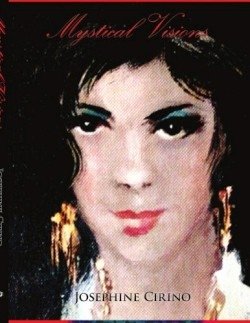Mystical Visions
Mystical Visions is author Josephine Cirino’s ode to her brother who was killed several years ago, and an exploration of her spiritual visions, dreams, and premonitions. Cirino believes she is blessed with the gift of second sight after spending time with her grandmother who also believed in the supernatural.
The author’s brother, Alfonso, was working as a manager at a grocery store in Cleveland when he was killed by an armed robber. Cirino was left broken-hearted and she recounts her memories of the times they shared. She feels she should have seen the tragedy coming, because of dreams she and her family members had in the months leading up to his death.
There are many ways to tell a story, but most successful tales are told, to some degree, in chronological order. Cirino begins by sharing some memories from her childhood, then moves ahead to lessons she learned about the stages of life after Alfonso’s death, then finally reveals the circumstances of his death. Thereafter, her story jumps around as she describes strange occurrences that she believes were signs from her brother. What could have been a loving tribute to the author’s hero and friend is marred by incomprehensible language, a perplexing timeline, and a dense and overlarge format.
Cirino works hard in the years following Alfonso’s death to find meaning in his short life, codes that could have foretold when he would die, and signs that his spirit is still with her. She dissects the numbers from the stamps in his passport, looks for signs in chocolate milk, examines her vivid dreams, and reads meaning into their past conversations.
One of the most frustrating aspects of the book is Cirino’s descriptions of “candle revelations” before she explains what they are, where she learned them, or when precisely each was performed. The ritual of allowing candles to melt, devised by the author, is finally explained in chapter eleven. The practice and the messages they reveal are obviously important to the author, but without a clear explanation of their concept, the first revelations will be meaningless to most readers.
Cirino apparently believes she has an important message to convey, and encourages readers to ask themselves questions in order to connect to the spiritual, but her words are couched in unintelligible language:
‘Envy’ written backwards ‘yvne’ can be defined, ‘I have need, whine and vine’ and ‘jealous’ written backwards ‘soulaej’ is the ‘soul on edge’. Combining the meaning of the two words creates ‘the soul’s need to become a crawling plant releasing sour fermentation that inhibits that state of mind in a mental invisible desperate whining, blinding and bewildering act of insecurity.’
The author’s many typos and grammatical missteps could be the result of her years spent living in Italy. But for this book to be an interesting read, it will require extensive editing, reformatting, and a more legible typeface.
Disclosure: This article is not an endorsement, but a review. The publisher of this book provided free copies of the book and paid a small fee to have their book reviewed by a professional reviewer. Foreword Reviews and Clarion Reviews make no guarantee that the publisher will receive a positive review. Foreword Magazine, Inc. is disclosing this in accordance with the Federal Trade Commission’s 16 CFR, Part 255.

